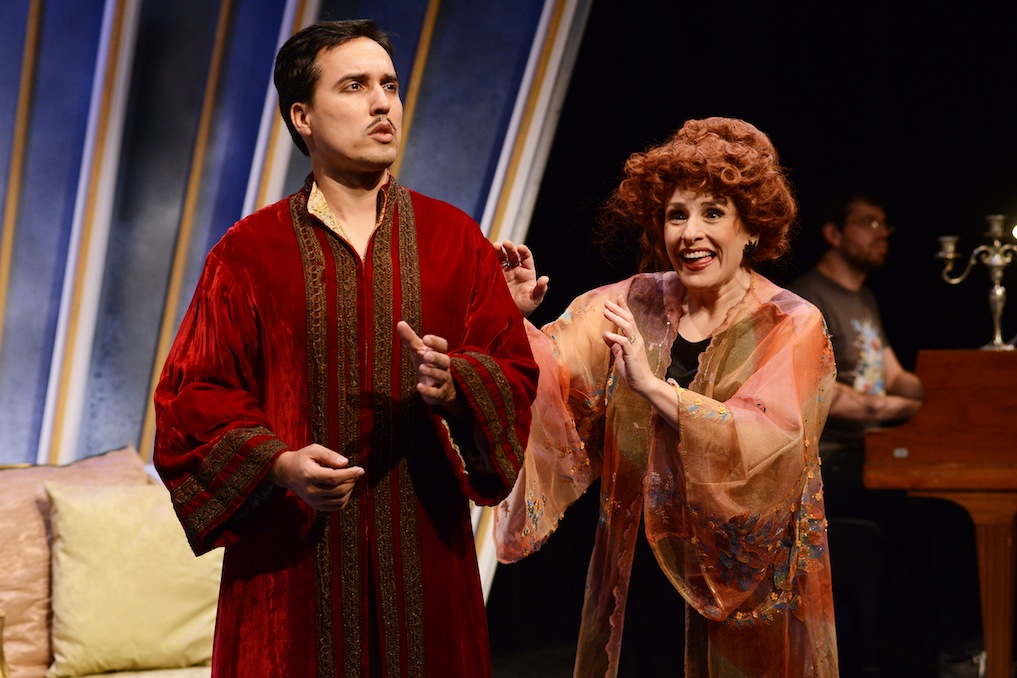New opera finds a fine madness in free-wheeling comedy

Joy Hermalyn and Eapen Leubner in Richard Pearson Thomas’s “A Wake or a Wedding.” Photo: Monica Simoes
Opera is best suited for madness and comedy. Why else would all these people be singing to you about everything, from their most private desires to the need for someone to answer that door!
Richard Pearson Thomas’s comic opera, A Wake or a Wedding, seen in its local premiere by the Encompass Opera Theatre at the Baruch Performing Arts Center Thursday night, is a fine example of both these elements of opera. There’s madness in it, and comedy, of course, both well-made and enjoyable.
The story is a simple one that explodes with jack-in-the-box absurdities: the “ruthless copper king,” Montanan Pierpont Mackerel Davenport has died just before his daughter Velena-Sue’s marriage. The resulting turmoil brings conflict between family members and household staff, the arrival of flamboyant visitors, and a series of personal revelations.
Plot-wise, this would make a good musical. But this is an opera, with the music not only supporting the characters but creating and shaping the drama too. The characters carry the comedy, leaving the music free to deliver an unexpected depth of feeling.
Pearson’s score is lyrical and lightly romantic, and he also wrote the libretto. One measure of its quality is that, without supertitles, every word is clear—an undervalued and essential feature. The other is that it has couplets like those sung by baritone Scott Lindroth, as Velena-Sue’s fiancée, Jack Highstraw, “Ever the optimist/The intrepid lepidopterist.”
Highstraw is just one of a good handful of principal characters, and all the performances were finely rendered. Small companies like Encompass mean performances with smaller voices that are nonetheless attractive and expressive.
Pearson gives all the characters a moment in the spotlight, and the trio of sopranos Marie Anello, as the seamstress Ambrosia, Caroline Bassett Miller as Velena-Sue, and Alison Davy as the widowed Dierdre, were strong, Miller especially adept at comedy, and Davy expressively wistful. Dierdre is mad at the beginning, then convincingly finds clarity.
All the performers were inherently comfortable within Nancy Rhodes capable direction, a reminder that the current prevalence of acting chops among singers is a welcome change from the 20th-century opera practice. Standing out were mezzo-soprano Joy Hermalyn and tenor Eapan Leubner, in the meaty parts of the flamboyant opera singer Marcella Sorella and her protégé Raimondo Vecchiofaraone, who comes from Egypt via Cairo, Illinois.
Their arrival—they had been contracted to perform at the wedding—sets a match to the kindling that, structurally, had threatened to grow damp with the constraints of the characters’ WASPy manners. They bring operatic slapstick, and the deep dramatic possibilities of the form.
Sorella, made to look like a cross between Bettie Davis and Lucille Ball, sings an aria about the opera characters she portrays, a spiraling, self-aware reflection that is furthered when, for the entertainment, she and Vecchiofaraone perform an opera-within-an-opera, an hilarious setting of Apuleio’s “Il Risveglio de Psiche d’Amore.” This internal narrative serves a three-fold purpose: paralleling the plot of A Wake, adding terrific musical variety and comedy, and parodying the opera-going experience, as the butler, Smelt (bass-baritone Adrian Rosas), provides ongoing translations from the ‘original’ Italian.
The effect is to move the characters towards a series of personal revelations and ultimate resolution. Some are screwball, some are quite lovely, all are satisfying. And a powerful connection is made internally to the details of the piece and its effect: while leading Vecchiofaraone through solfege, Sorella tells him opera is sung “for attention! For money!” But the tenor sings that it is “to awake slumbering souls” and “to transcend,” and “Il Risveglio” reveals the cunning pun in the opera’s title.
One debit is that the denouement feels like it takes a long time to unwind, and with all the confession, the music loses some pace. That might have been the fault of the playing of the IONISATION New Music Group, under conductor Mara Waldman. With the orchestra at stage left on the same level as the singers, balances were a real problem, and soprano Lindsay Rider, as the scheming, thieving maid Miss O’Dell, suffered the most from having her voice buried.
Worse, though, was the overall wan playing and amateurish lack of preparation of the orchestra. Waldman could be heard, clearly and distractingly, calling out rehearsal numbers and urging “Back, back again.” There are more performances to come and hopefully the ensemble playing will improve.
A Wake or a Wedding continues through November 16. encompassopera.org






